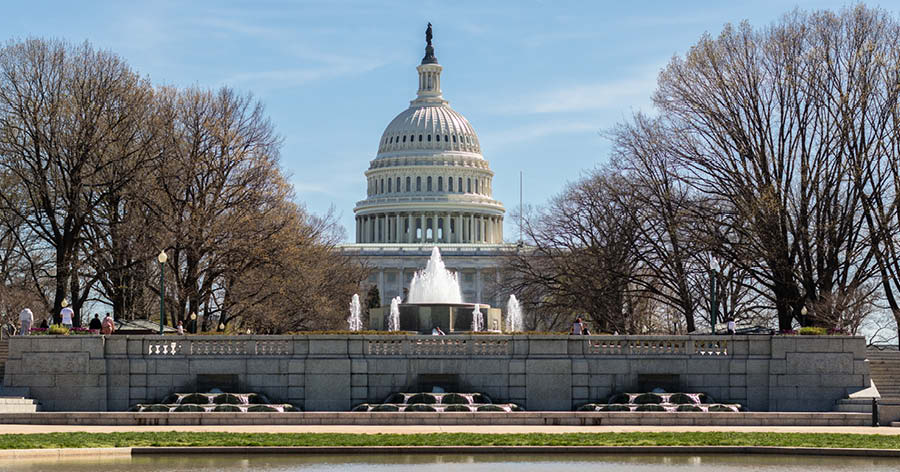President Trump surprised lawmakers at the White House last week when he used a live, televised meeting ostensibly about immigration legislation to voice his support for earmarks.
“Maybe you should start thinking about going back to a form of earmarks,” Trump said, laying out a familiar — but hotly contested — argument that when earmarks were in fashion, Washington worked better. “Maybe that brings people together. In our system right now, the way it is set up, will never bring people together.”
This week, lawmakers will get to make their case on earmarks, which are provisions in bills that direct funds to a specific recipient. The House Rules Committee is holding two days of public hearings on the GOP-led earmark ban that has been in effect since 2011. On Wednesday, the committee will hear testimony from lawmakers, and on Thursday, from outside advocates.
The hearings are part of a deal cut by House Speaker Paul Ryan, R-Wis., at the beginning of this Congress. The House Republican Conference was on the verge of voting in a secret ballot, behind closed doors, to reinstate earmarks when Ryan intervened and said it would send the wrong message after the recent election of a president who had promised to “drain the swamp.” Instead, he pledged to his rank-and-file that there would be a public debate about it.
The speaker was noncommittal when asked whether earmarks are poised for a comeback. “Conversations are having a comeback,” he told reporters. “We’ve encouraged our members all along to talk about budget process reforms. Many of us have opinions on this issue, but I want our members to have conversations.”
Ryan strongly supported the earmark ban seven years ago and, in a Friday interview with C-SPAN, was lukewarm about the notion that earmarks could return. “We’ve got to make sure we don’t go back to pork-barrel spending,” he said. He did acknowledge the frustration among lawmakers that the ban has shifted too much power to the executive branch to decide how taxpayer dollars get spent.
One of those frustrated Republicans is Rep. Tom Rooney of Florida, a vocal proponent of reviving earmarks with limits. Earmark opponents “like to roll out these pork-barrel, illegal things that people went to jail for. I’m talking about vetted, in the light of day, through the committee process, projects in members districts that they can go home to and say, ‘I got this done for my constituents,’ ” Rooney said.
Rooney believes, as many earmark advocates do, that the ban was well-intended but has only served to contribute to more gridlock. “This place isn’t working; your government is not working,” he said, pointing to the seemingly endless fights over government shutdowns and low legislative input that has defined the years since the earmark ban took effect. He would like to see earmarks return, but only for public projects, like schools and infrastructure, and not for anything that would benefit private entities, like businesses or campaign donors.
It’s not just Republicans who would like to see an earmark revival. House Minority Whip Steny Hoyer, the No. 2 House Democrat, told reporters last week that he would like to see earmarks return in some form as well. Hoyer is a former member of the Appropriations Committee, where earmarks were doled out. Most committee members strongly support bringing earmarks back.
Steve Ellis with Taxpayers for Common Sense, a nonpartisan watchdog group that was a leading critic of past earmark practices, will testify this week. He said Republicans don’t have a great track record of restraint when it comes to doling out earmarks. “They kind of created the whole environment,” he said. “We went from, in 1996 according to the Congressional Research Service, there were 3,000 earmarks in all of the spending bills. In 2005, there were more than 15,000.”
That decade-long era of the House GOP majority also led to a wave of corruption scandals involving earmarks that ultimately included prison sentences for people like former Republican lobbyist Jack Abramoff and former Rep. Randy “Duke” Cunningham, R-Calif.
One of the main ethical problems with earmarks is they were often airdropped into legislation at the last minute to win votes, with little oversight of how the money was spent. “Once the money was appropriated and the earmark went out, there was no oversight to see did it actually go to that project? Did it actually do that? Congress is very lazy, in our opinion, about doing oversight and that’s really their fundamental job,” Ellis said.
Democrats were not immune to earmark abuses and made some efforts to change the system when they held the majority from 2007 to 2011. They instituted more disclosure requirements but didn’t ban earmarks. They were becoming so increasingly politically toxic that many lawmakers pledged to stop making earmark requests — including then-Sen. Barack Obama, D-Ill., in 2008.
Rep. Jim Cooper, D-Tenn., is a longtime earmark opponent. “The old practice was so abusive, I remember looking through an old intelligence bill, which was secret and classified and no one could see it. There a very senior, powerful member of Congress had gotten one-quarter of all of the earmarks that were in the bill and he wasn’t even on the committee,” he recalled. “It’s incredible what theft will take place if nobody is looking.”
Another longtime earmark opponent, Sen. Claire McCaskill, D-Mo., rejects the argument that earmarks helped grease the skids of Washington. “That’s just not true. I mean, and frankly, if that’s it, if in order for us to function and find common ground and compromise and get things done, we’ve got to get bought off with a special project our state, then we’re in worse shape than I thought we were,” she said.
What earmark advocates and opponents alike seem to agree on is that, in private, most lawmakers would indeed like to see earmarks make a comeback in some form. “If everyone didn’t think there’d be a political pushback, most people would be for reinstating them,” McCaskill said, “I hope there’s a political pushback. I hope people get their pitchforks out and say, ‘What are you doing?’ ”
The earmark moratorium was put into effect by a private vote by the House Republican Conference after the party won a House majority in 2010. But GOP leadership sources say any effort to revive earmarks would have to be done in public and be transparent. If they do, Ellis says, the GOP will own the political risks that come with it.
“The Republican Conference put in the moratorium, and now if they take it out, they’re going to own the fact that they brought back earmarks and any of the warts that go along with it,” he said.













Get Social